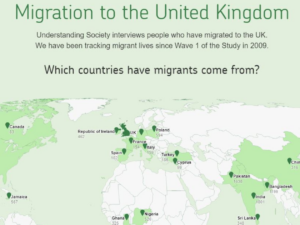Using Understanding Society to research ethnicity
Dr Alita Nandi, Associate Director of Outreach and Senior Research Fellow.
What data do Understanding Society collect?
Access the ethnicity data
Tips for analysts
Use the code creator
Create your own Stata code to extract the data you need from the EUL main survey. Save your variables, then use the code creator to generate your code. The code will allow you to create your own data file containing your variable selection, plus a handy set of commonly used sociodemographic variables and cross-sectional and longitudinal weights.
Index terms
To find out about the specific questions asked in the Study use the index terms where you can search for ethnicity and immigration variables, including the extra five minutes variables asked specifically to ethnic minority and immigrant participants. You can also find variables for ethnicity, harassment and employment.
Questionnaire modules
The questionnaire modules show the areas covered in each wave of the Study and allow you to see the actual questions asked in the survey.
Need help?
Visit our new user pathway to explore the data and online resources or contact the User Support forum if you have a question for the Study team.
Webinar: Ethnicity and migration research using Understanding Society
Case study: Black people over three times more likely to experience homelessness
Research using Understanding Society finds history of discrimination linked to higher risk of homelessness.
Podcast: Breathing unequal air in the UK
Does pollution affect immigrant populations disproportionately?
Constructing a migration and life dataset
Who has joined UKHLS as a migrant? Where have they migrated from? And where are they employed? The migration and life dataset was created by Understanding Society fellow Dr Marion Lieutaud. This interactive shows the headline findings.



